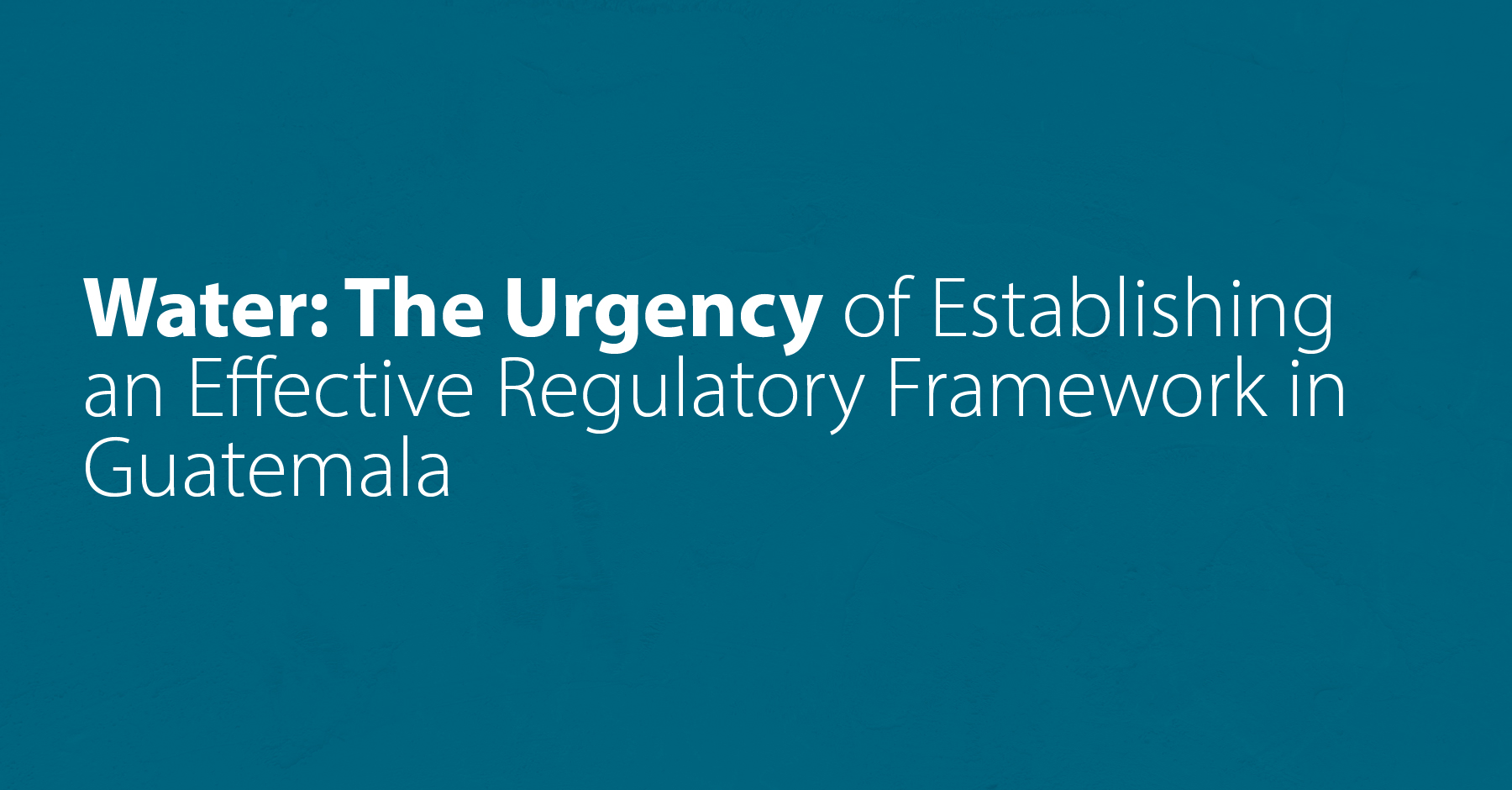Water, essential for human existence, agriculture, and industry, has always been a natural resource of an incalculable value. In the Guatemalan context, although there are indeed legal provisions for the protection and management of water, we face significant challenges in their implementation and adaptation.
First, we observe a lack of consistent and consistent application of existing laws and regulations, leading to gaps in the protection and proper use of the resource. Second, the current structure of our water regulations appears not to have been designed considering the geographic, demographic, and socioeconomic realities that characterize Guatemala, resulting in insufficiencies when addressing current water-related problems.
It is a challenge that concerns us all since water, beyond being a resource, is a fundamental human right.
The current situation: An insufficient legal framework
In Guatemala, although there are laws that seek to regulate and protect water resources, we find a regulatory framework that has not evolved at the pace that current circumstances demand. These laws, some enacted decades ago, do not adequately reflect or address the complexities of today’s Guatemala. A constantly growing population has vastly increased the demand for water for human, agricultural, and industrial consumption. To this, we must add the implications of climate change, which manifests itself in extreme phenomena such as prolonged droughts or floods, altering the availability and quality of the resource.
This outdated regulatory reality translates into deficiencies that impact society and the environment. On the one hand, the absence of effective measures to control and supervise the extraction of water has allowed the overexploitation of our aquifers, endangering their long-term sustainability. On the other hand, the lack of effective control and sanction mechanisms results in rivers, lakes, and underground sources suffering contamination due to industrial and agrochemical discharges without due treatment. And perhaps most worrying is that this outdated legal situation perpetuates historical inequalities in water usage, where entire communities face difficulties accessing quality drinking water. Meanwhile, industrial and agricultural sectors often enjoy irresponsible resource privileges. By any measure, it is evident that the current legal framework is grossly inadequate and, if not updated, could soon lead to a devastating crisis.
Tangible effects of inadequate management
Undeniably, the impact of inadequate water resource management is evident in the daily lives of many Guatemalans. In urban and rural areas, it is not uncommon for families to face constant supply problems, where water only arrives for a few hours or, in the worst cases, only a few days a week. These interruptions generate inconveniences in daily activities and force people to resort to alternative sources that often do not have adequate quality for human consumption.
The painful situation disproportionally affects rural communities and indigenous areas, where access to drinking water is practically a utopia. In these regions, communities often depend on rivers, lakes, or wells, which are too often polluted. This lack of access to safe water not only affects the health of the inhabitants, generating gastrointestinal diseases and other disorders but also hinders community development and aggravates living conditions.
At the same time, the environmental impact is equally alarming. Since industries are not subject to strict and effective regulation, they dump toxic waste into rivers and lakes without penalty. These discharges kill aquatic fauna and flora, altering entire ecosystems and contaminating water sources later used by surrounding communities. The effects on public health are devastating, with increases in diseases related to water pollution and exposure to harmful chemicals.
This bleak picture reflects shortcomings in water management and regulation in Guatemala and calls for urgency to reverse and prevent even worse future damage.
The need for renewed regulations
The regulations in force in Guatemala regarding water may once have been adequate but are no longer robust or consistent enough to deal with the challenges that current events present to us. The demands of a growing population, industrial advancement, and the threats of climate change require a legal response that is up to the task.
A modern and adapted legal framework is essential not only to guarantee the supply and quality of water but also to address problems related to its management, such as pollution and inequitable distribution. Water is not just a resource but a fundamental human right. Legislation must reflect this understanding.
In addition, a standardized and updated regulation would clarify the law for the different actors involved. Authorities would have precise guidelines to monitor and punish bad practices, companies would have clear guidelines on how to operate sustainably, and communities would have a legal tool to support them in their quest to guarantee access to water.
A renewed regulatory framework would also promote sustainable practices, encouraging the reuse and adequate treatment of water, as well as investment in technologies and infrastructures for optimal resource management. This regulation should result from a national consensus involving all interested parties to guarantee that it adapts to the diverse regional realities of Guatemala and effectively protects one of our most precious assets.
Towards sustainable management
Guatemala, with extensive rivers, lakes, and underground sources, has the potential to be a benchmark in water management. However, we must return to look at water not only as a resource but also as an inalienable right of every Guatemalan. This view implies a guarantee of equitable access to water to ensure that each citizen can rely upon having drinking water and adequate sanitation, regardless of their geographic location or socioeconomic situation.
On the other hand, protecting our aquatic ecosystems is not only a matter of environmental preservation but is also necessary to maintain the water cycle balance. Rivers and lakes are crucial to regulating watersheds, preventing floods, and conserving biodiversity. It is essential to adopt practices that prevent pollution and overexploitation and that, at the same time, promote the regeneration of these ecosystems.
Finally, sustainable management implies a long-term vision. It is about thinking about how our actions today will affect future generations. The decisions we make now regarding water regulation and conservation will determine the kind of legacy we leave behind.
Therefore, a call to action that is more than mere words is necessary. Communities, organizations, companies, and government entities must unite efforts, share knowledge, and establish real commitments. Creating a regulatory framework adapted to the needs of Guatemala is not only a task for experts but for all those who drink, use, and value water.
Guatemala’s water wealth is an inheritance and, at the same time, a commitment. To preserve and manage it properly means ensuring that future generations can enjoy a resource that, beyond its economic value, is essential for life. May this call to action begin our journey towards fair, equitable, and sustainable water management.
Rodolfo Salazar
Partner
Guatemala
E-mail




